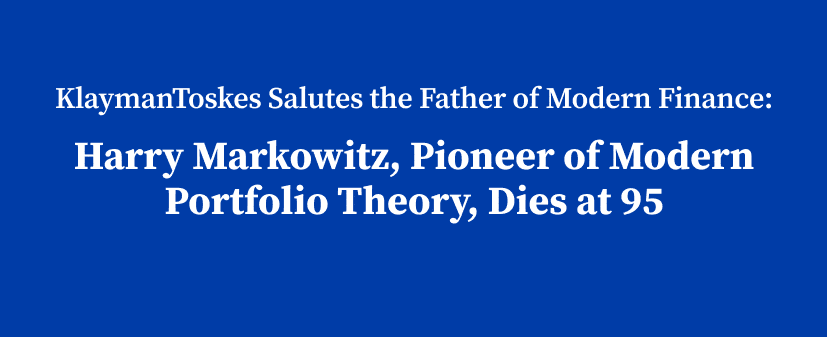
National securities lawyers KlaymanToskes reports revolutionary economist Harry M. Markowitz, known as the father of Modern Portfolio Theory, has died at 95 years old. On Thursday, June 22, Markowitz died of pneumonia and sepsis at a hospital in San Diego, according to the New York Times.
Harry Markowitz redefined investment management by pioneering the Modern Portfolio Theory, a revolutionary investment approach founded on his insight that the overall performance and makeup of an investor’s complete portfolio outweigh the significance of an individual stock’s performance.
Harry Markowitz’s 1952 article, “Portfolio Selection,” published by the Journal of Finance, brought forth a new perspective on money management by focusing on the importance of diversification and the relationship between risk and return.
Markowitz’s article revolutionized the field of finance, introducing the concept of Modern Portfolio Theory (MPT) as a groundbreaking investment strategy. By emphasizing the significance of constructing a well-balanced portfolio rather than solely focusing on individual stock performance, Markowitz challenged conventional wisdom and laid the foundation for a more comprehensive approach to wealth management.
Markowitz’s research also introduced the concept of the efficient frontier, which illustrates the range of optimal portfolios that offer the highest possible return for a given level of risk. By analyzing the trade-off between risk and reward, investors can identify the portfolio allocation that aligns with their risk tolerance and financial goals.
Further, Markowitz’s work emphasized the importance of regularly monitoring and adjusting portfolios to maintain their desired risk and return characteristics. This dynamic approach, known as portfolio rebalancing, ensures that the portfolio remains aligned with the investor’s objectives as market conditions and asset performances change over time.
Markowitz began his academic journey at the University of Chicago, where he earned his bachelor’s degree in economics in 1947. He further pursued his education at the University of Chicago’s Graduate School of Business, where he obtained his master’s degree in economics in 1950.
The impact of Markowitz’s work was profound, and in 1990, while working as a finance professor at Baruch College of the City University of New York, he was awarded the Nobel Prize in Economic Sciences for his theory of allocation of financial assets under uncertainty, also known as the theory of portfolio choice.
Prior to being awarded his Nobel Prize, Markowitz received the John von Neumann Theory Prize from the Operations Research Society of America (now known as the Institute for Operations Research and the Management Sciences, INFORMS).
Throughout his career, Markowitz held several academic positions, including professorships at the University of Chicago, Baruch College, and the Rady School of Management at the University of California, San Diego. In addition to his academic pursuits, he served as a research consultant for many esteemed organizations, including the RAND Corporation and the CFA Institute.
In recognition of his groundbreaking work, Harry Markowitz’s legacy as an economist and pioneer in portfolio theory remains a testament to his intellect, innovation, and lasting impact on the field of finance.
KlaymanToskes is a leading national securities law firm which practices exclusively in the field of securities arbitration and litigation on behalf of retail and institutional investors throughout the world in large and complex securities matters. The firm has recovered more than $250 million for investors in FINRA arbitrations and over $350 million in other securities litigation matters for its clients. KlaymanToskes has office locations in California, Florida, New York, and Puerto Rico.
KlaymanToskes, P.A.
Lawrence L. Klayman, Esq.
888-997-9956
lklayman@klaymantoskes.com
www.klaymantoskes.com